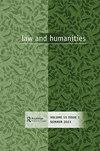Lord Atkin, the snail and the foreigner: loving the neighbour and oppressing the alien
IF 0.2
Q3 LAW
引用次数: 0
Abstract
ABSTRACT In Donoghue v Stevenson, Lord Atkin in the majority perceived the Christian principle of loving one’s neighbour to require a duty of reasonable care to the neighbour, who was [a person who is] ‘so closely and directly affected by my act that I ought reasonably to have them in contemplation as being so affected when I am directing my mind to the acts or omissions which are called in question’. In Liversidge v Anderson his Lordship held in dissent that ‘In England amidst the clash of arms the laws are not silent. They may be changed, but they speak the same language in war as in peace. It has always been one of the pillars of freedom, one of the principles of liberty for which, on recent authority, we are now fighting, that the judges are no respecters of persons, and stand between the subject and any attempted encroachments on his liberty by the executive, alert to see that any coercive action is justified in law’. Lord Atkin was a practising Christian, and both statements appear to have biblical roots. As no-one seems to have done before, this paper brings an exegetical focus to those roots to see whether or not they provide support for Lord Atkin’s approach in each case.阿特金勋爵,蜗牛和外国人:爱邻居,压迫外国人
在多诺霍诉史蒂文森案(Donoghue v Stevenson)中,阿特金勋爵(Lord Atkin)在多数意见中认为,基督教爱邻居的原则要求对邻居有合理注意的义务,因为邻居是一个“受到我的行为如此密切和直接影响的人,以至于当我把注意力集中在被质疑的行为或不作为上时,我应该合理地让他们在沉思中受到如此影响”。在利弗西奇诉安德森案中,法官大人持不同意见,认为“在英格兰,在武装冲突中,法律并非沉默。”他们可能会改变,但他们在战争中说的是同一种语言。这一直是自由的支柱之一,是我们现在以最近的权威为之奋斗的自由原则之一,法官不尊重个人,站在主体和行政机关对其自由的任何企图侵犯之间,警惕地看到任何强制行动在法律上是正当的。”阿特金勋爵是一名虔诚的基督徒,这两句话似乎都有圣经的根源。在此之前似乎没有人做过这样的事情,这篇论文对这些根源进行了注释,看看它们是否在每种情况下都为阿特金勋爵的方法提供了支持。
本文章由计算机程序翻译,如有差异,请以英文原文为准。
求助全文
约1分钟内获得全文
求助全文
来源期刊

Law and Humanities
LAW-
CiteScore
1.00
自引率
0.00%
发文量
21
期刊介绍:
Law and Humanities is a peer-reviewed journal, providing a forum for scholarly discourse within the arts and humanities around the subject of law. For this purpose, the arts and humanities disciplines are taken to include literature, history (including history of art), philosophy, theology, classics and the whole spectrum of performance and representational arts. The remit of the journal does not extend to consideration of the laws that regulate practical aspects of the arts and humanities (such as the law of intellectual property). Law and Humanities is principally concerned to engage with those aspects of human experience which are not empirically quantifiable or scientifically predictable. Each issue will carry four or five major articles of between 8,000 and 12,000 words each. The journal will also carry shorter papers (up to 4,000 words) sharing good practice in law and humanities education; reports of conferences; reviews of books, exhibitions, plays, concerts and other artistic publications.
 求助内容:
求助内容: 应助结果提醒方式:
应助结果提醒方式:


